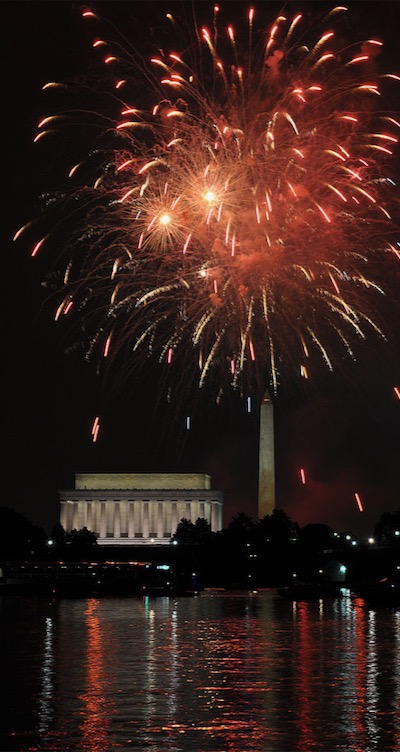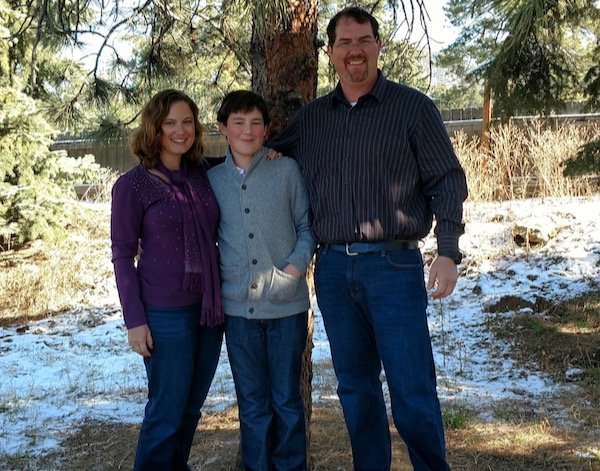
Fourth of July fireworks seen across the Potomac River at Washington, D.C., USA (Shared by photographer Joe Ravi under Creative Commons license CC-BY-SA 3.0)
EDITOR’S NOTE—Our online magazine is proud, each week, to present a family of writers from many different religious traditions—Christian, Jewish, Muslim and others. Our cover story this week, for example, is about a man who was a self-proclaimed atheist—yet had a powerful spiritual message about breaking down cultural barriers. In this particular column, we invited author Amy Morgan to tell us about how she—and her congregation in Colorado—are approaching our major U.S. holiday this week.
By AMY MORGAN
Contributing Columnist
As we approach the July 4th holiday, our nation prepares to celebrate. We’ll have cook-outs and fireworks, sing patriotic songs and fly flags. (I’ll be drag racing, by the way)
But what, exactly, are we celebrating?
Many would say, “freedom.” But freedom from what? Tyranny, some might say. And this might be true for those revolutionaries in 1776. But when I look at our lives in this country today, I see a great deal of tyranny still in existence.
Our pockets may not be drained by taxation without representation, but the tyranny of fear, of scarcity, of accumulation, achievement, appearance are doing that job quite well.
We may not be ruled by a wealthy king, but there is plenty of tyranny to be protested in campaign finances and compensation policies of our politicians.
And there are many in this country who feel they have never experienced the same freedom as those who are privileged by virtue of skin color, gender, or social class. There are minorities who live under the tyranny of the majority.
It seems clear that only tyrants would even consider imprisoning children and families.
Does this mean we should not celebrate? Or, that we have nothing to celebrate? By no means!
Revolutionaries gave their lives hoping to birth a nation that would not just be free—but alive, liberated, and hopeful. “Life, liberty, and the pursuit of happiness,” those “inalienable rights” in our Declaration of Independence, offer up a vision of the best of what our nation might become. That it hasn’t reached this lofty goal in 242 years is no reason to give up on celebrating its possibility and potential.
People of Christian faith, however, do not place our national citizenship before, in opposition to, or conflated with, our citizenship in the commonwealth of heaven. Rather, our Christian identity and witness inform our civic participation.
We undeniably have dual citizenship, but our homeland is where God reigns sovereign. As such, we have the joyful burden of witnessing to the true liberation that can only come from God’s love for the whole world in Jesus Christ. This informs what we praise and what we protest, how we pray and what we speak, how we vote and how we spend our time, money, and energies.
In my church last Sunday, we celebrated our citizenship in the realm of God through readings from scripture and our Reformed confessions, interspersed with hymns praising God’s reign. I hope that this has prepared our souls to celebrate the birth of our nation, in all its flaws and failings, in all its hope and splendor, as dual citizens longing after the ideals of our earthly nation and the completion of God’s dominion on earth.
Meet Amy
The Rev. Amy Morgan is pastor of First United Presbyterian Church in Loveland, CO. Most recently, she contributed to the second edition of Friendship and Faith, a collection of women’s stories about crossing religious and cultural divides to form friendships. She currently serves as Vice-President of the board of Yucatan Peninsula Missions and on the Committee on Preparation for Ministry for the Presbytery of Plains and Peaks. Amy and her husband, Jason, have a son, Dean. They love hiking in the mountains and biking around town.

